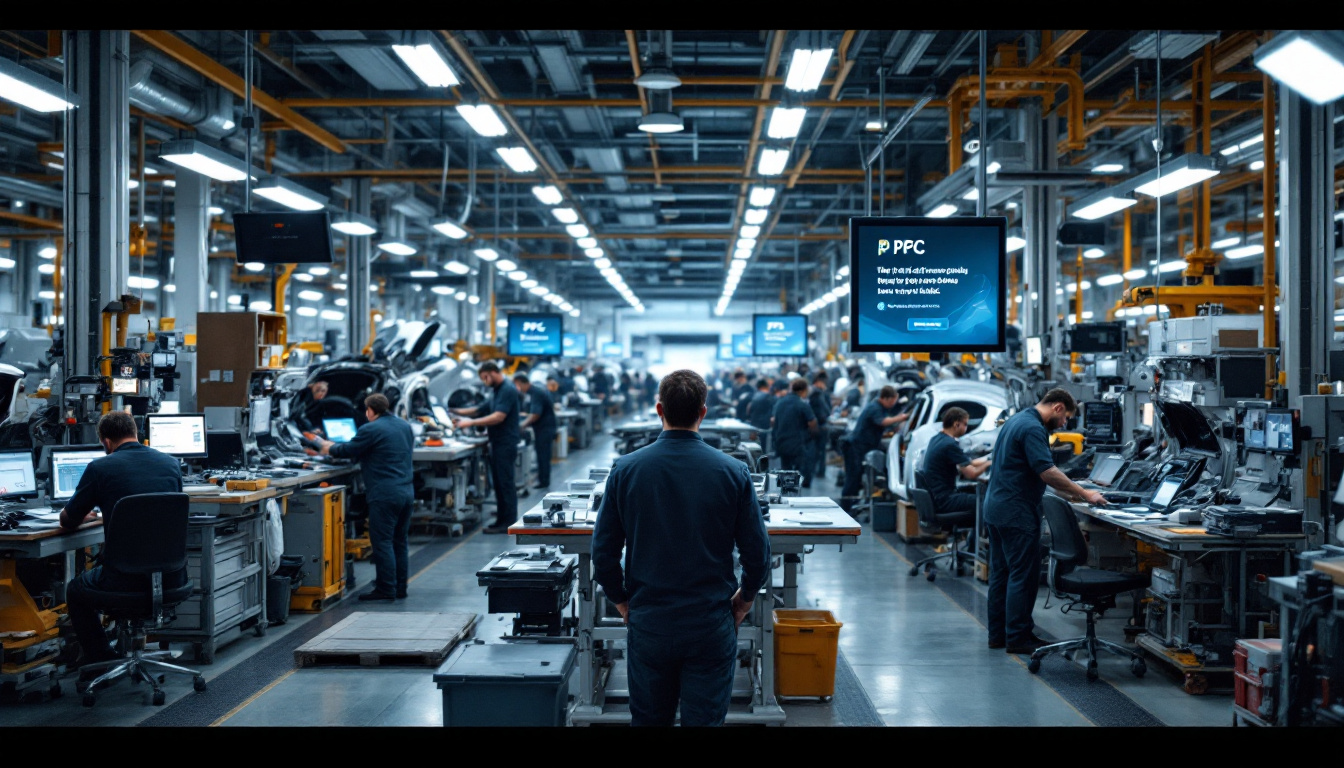The Beginner's Guide to PPC Advertising in Raleigh, NC

PPC advertising, or pay-per-click advertising, has emerged as an essential marketing strategy for businesses wanting to capture the attention of potential customers. In Raleigh, NC, a city thriving with entrepreneurial spirit, mastering the art of PPC can significantly enhance your online presence and drive targeted traffic to your website. This guide aims to provide an in-depth understanding of PPC advertising tailored specifically for Raleigh businesses.
What is PPC and how does it work?
PPC, or pay-per-click advertising, is a model of online marketing in which advertisers pay a fee each time one of their ads is clicked. Essentially, it’s a way of buying visits to your site rather than attempting to “earn” those visits organically through SEO efforts. The most common platform for PPC is Google Ads, where advertisers bid on keywords relevant to their offerings in order to appear in search results.
The operation of PPC can be broken down into several components: keywords, ad auction, and quality score. When someone searches for a term that matches your keywords, your ad has the chance to appear alongside search results. This visibility is determined by an auction system where advertisers bid on keywords. Importantly, the quality score of your ad plays a crucial role in this process, assessing the ad's relevance and click-through rate, which can influence the cost of the clicks.
The components of PPC advertising
The structure of a PPC campaign typically includes:
- Keywords: Selecting relevant keywords that potential customers are likely to use when searching for your product or service.
- Ad copy: Creating compelling advertisements that encourage users to click through.
- Landing pages: Ensuring the destination page is optimized for conversions.
Understanding these components will help you make informed decisions and optimize your campaigns effectively. Additionally, it’s essential to monitor the performance of your PPC campaigns regularly. This involves analyzing metrics such as click-through rates (CTR), conversion rates, and return on ad spend (ROAS). By keeping a close eye on these metrics, you can identify which ads are performing well and which may need adjustments or even complete overhauls.
Another vital aspect of PPC is the ability to target specific demographics and geographic locations. This means you can tailor your ads to reach the audience most likely to convert, enhancing the efficiency of your advertising budget. For instance, if you run a local business, you can set your ads to appear only to users in your area, ensuring that your marketing efforts are focused on potential customers who are more likely to visit your store or use your services. This level of targeting not only improves the effectiveness of your campaigns but also helps in maximizing the return on investment.
Why PPC is ideal for businesses in Raleigh, NC
Raleigh, NC, is home to a diverse range of businesses, from tech startups to healthcare providers, making it a competitive marketplace. One of the compelling advantages of PPC advertising is its ability to reach targeted demographics quickly and effectively.

With Raleigh's growing digital landscape, businesses can capitalize on local targeting to connect with consumers in their geographic area. For instance, a local restaurant could create ads specifically aimed at residents within a five-mile radius. This capability not only enhances visibility but also increases the likelihood of conversions because local consumers are often more inclined to seek nearby options. Moreover, with the influx of new residents drawn to Raleigh's vibrant culture and job opportunities, businesses have a unique chance to tap into a fresh audience eager to explore local offerings.
Benefits of PPC for Raleigh businesses
Here are several reasons businesses in Raleigh should consider implementing PPC advertising:
- Immediate results: Unlike organic SEO efforts which can take time to yield results, PPC can drive traffic to your site almost instantly.
- Targeted reach: PPC campaigns allow precise targeting based on keyword usage, location, and even specific demographics.
- Budget control: You only pay when someone clicks your ad, making it easier to control your marketing budget.
As a result, businesses can take advantage of a network of opportunities to increase their customer base rapidly. Additionally, the ability to track and analyze the performance of PPC campaigns in real time allows Raleigh businesses to make data-driven decisions, optimizing their strategies for better results. This adaptability is crucial in a city that is continuously evolving, as it enables businesses to stay ahead of trends and consumer preferences.
Furthermore, the competitive nature of Raleigh's market means that businesses cannot afford to overlook the potential of PPC. With numerous companies vying for the attention of the same audience, leveraging PPC can provide a significant edge. For example, seasonal promotions or limited-time offers can be effectively highlighted through targeted ads, ensuring that potential customers are aware of the latest deals. This not only drives immediate traffic but also fosters brand loyalty, as consumers appreciate timely and relevant information tailored to their needs.
How to set up a PPC campaign step-by-step
Setting up a PPC campaign can seem daunting, particularly for first-time users. However, by following a structured approach, you can create a successful campaign that generates results.
Step 1: Define your goals
Before embarking on your PPC journey, it's vital to identify what you wish to achieve. Whether it’s increasing website traffic, generating sales, or collecting email addresses, having a clear goal is essential for measuring campaign success. Consider using the SMART criteria—specific, measurable, achievable, relevant, and time-bound—to refine your objectives further. This will not only guide your campaign strategy but also help you evaluate performance effectively.
Step 2: Keyword research
Conduct thorough keyword research to find out which terms are being used by your target audience. Tools like Google Keyword Planner and SEMrush can help you uncover high-volume keywords that match your business intentions. Additionally, consider analyzing competitor keywords to identify gaps in your strategy and discover new opportunities. Long-tail keywords, which are typically less competitive and more specific, can also yield higher conversion rates by targeting users who are further along in the buying process.
Step 3: Create engaging ads
Your ads are the first point of contact with potential customers. Craft compelling, relevant ads that entice clicks. Highlight what makes your business unique and include strong call-to-action phrases. Incorporating ad extensions, such as site links, callouts, and structured snippets, can enhance your ad's visibility and provide additional information, making it more appealing to users. A/B testing different ad variations can also help you identify which messages resonate best with your audience.
Step 4: Choose your landing page
The landing page must align with your ad and facilitate conversion. It should load quickly, provide pertinent information, and have an easily identifiable call-to-action. Ensure that the design is user-friendly and mobile-responsive, as a significant portion of traffic comes from mobile devices. Additionally, consider using elements such as testimonials, reviews, or trust badges to build credibility and reassure visitors that they are making a wise choice by engaging with your brand.
Step 5: Set your budget
Establish a daily or monthly budget that aligns with your business objectives and allows for gradual growth. Starting with a modest budget can give you enough data to optimize future spending. Monitor your campaigns closely and be prepared to adjust your budget based on performance metrics. Utilizing automated bidding strategies can also help you maximize your budget by adjusting bids in real time to achieve your desired outcomes.
Tips for choosing the right PPC keywords
Selecting the right keywords is crucial for the success of your PPC campaigns. Here are some tips to ensure that you're targeting the most effective terms:

Tip 1: Be specific
Focusing on long-tail keywords—those with three or more words—can yield better results. These keywords typically have less competition and are more aligned with the buyer's intent. For example, instead of targeting a broad term like "shoes," you might opt for "best running shoes for flat feet." This specificity not only helps in attracting a more targeted audience but also increases the likelihood of conversion, as users searching for detailed terms are often further along in their buying journey.
Tip 2: Analyze competitors
Examine the keywords your competitors are bidding on. Tools like SpyFu can provide insights into the paid keywords your competitors use, giving you ideas for your own strategy. Additionally, consider looking at their ad copy and landing pages to understand how they are positioning their products or services. This analysis can reveal gaps in your own strategy and highlight opportunities for differentiation, allowing you to craft compelling ads that stand out in a crowded marketplace.
Tip 3: Use negative keywords
Incorporate negative keywords to prevent your ads from appearing for irrelevant searches. For instance, if you sell premium services, adding "free" as a negative keyword will help ensure your ad doesn’t show up in those contexts. Regularly reviewing your search term reports can also help you identify new negative keywords to add, refining your targeting further. This proactive approach not only saves your budget by avoiding unqualified clicks but also enhances the overall performance of your campaigns by ensuring that your ads are shown to the most relevant audience.
Tip 4: Leverage keyword research tools
Utilizing keyword research tools such as Google Keyword Planner, Ahrefs, or SEMrush can provide invaluable data on search volume, competition, and related keywords. By analyzing this data, you can uncover trends and discover new opportunities that may not be immediately obvious. For instance, you might find that certain phrases are gaining popularity, indicating a shift in consumer behavior. Staying ahead of these trends can give your campaigns a competitive edge and help you allocate your budget more effectively.
Tip 5: Monitor and adjust
Keyword performance can change over time due to various factors such as market trends, seasonality, and changes in consumer behavior. Regularly monitoring your PPC campaigns allows you to identify underperforming keywords and make necessary adjustments. This could involve pausing certain keywords, reallocating budget to more successful terms, or even experimenting with new keywords based on recent insights. By maintaining an agile approach to your keyword strategy, you can ensure that your campaigns remain effective and aligned with your business goals.
How to track and measure success in PPC
Tracking and measuring the success of your PPC campaigns is vital for understanding their effectiveness and making necessary adjustments. Google Ads provides a range of metrics to help gauge performance.
Key metrics to monitor
Some of the essential metrics to keep an eye on include:
- Click-Through Rate (CTR): The ratio of users who click on your ad to the total users who view it.
- Conversion Rate: The percentage of visitors who complete the desired action after clicking your ad.
- Quality Score: A metric that determines your ad's relevance and can affect your ad placement and costs.
Regularly analyzing these metrics will help you fine-tune your campaigns for better performance and return on investment. By understanding what works and what doesn’t, you can iteratively improve your PPC efforts.

As a Google Ads expert, I bring proven expertise in optimizing advertising campaigns to maximize ROI.
I specialize in sharing advanced strategies and targeted tips to refine Google Ads campaign management.
Committed to staying ahead of the latest trends and algorithms, I ensure that my clients receive cutting-edge solutions.
My passion for digital marketing and my ability to interpret data for strategic insights enable me to offer high-level consulting that aims to exceed expectations.



















